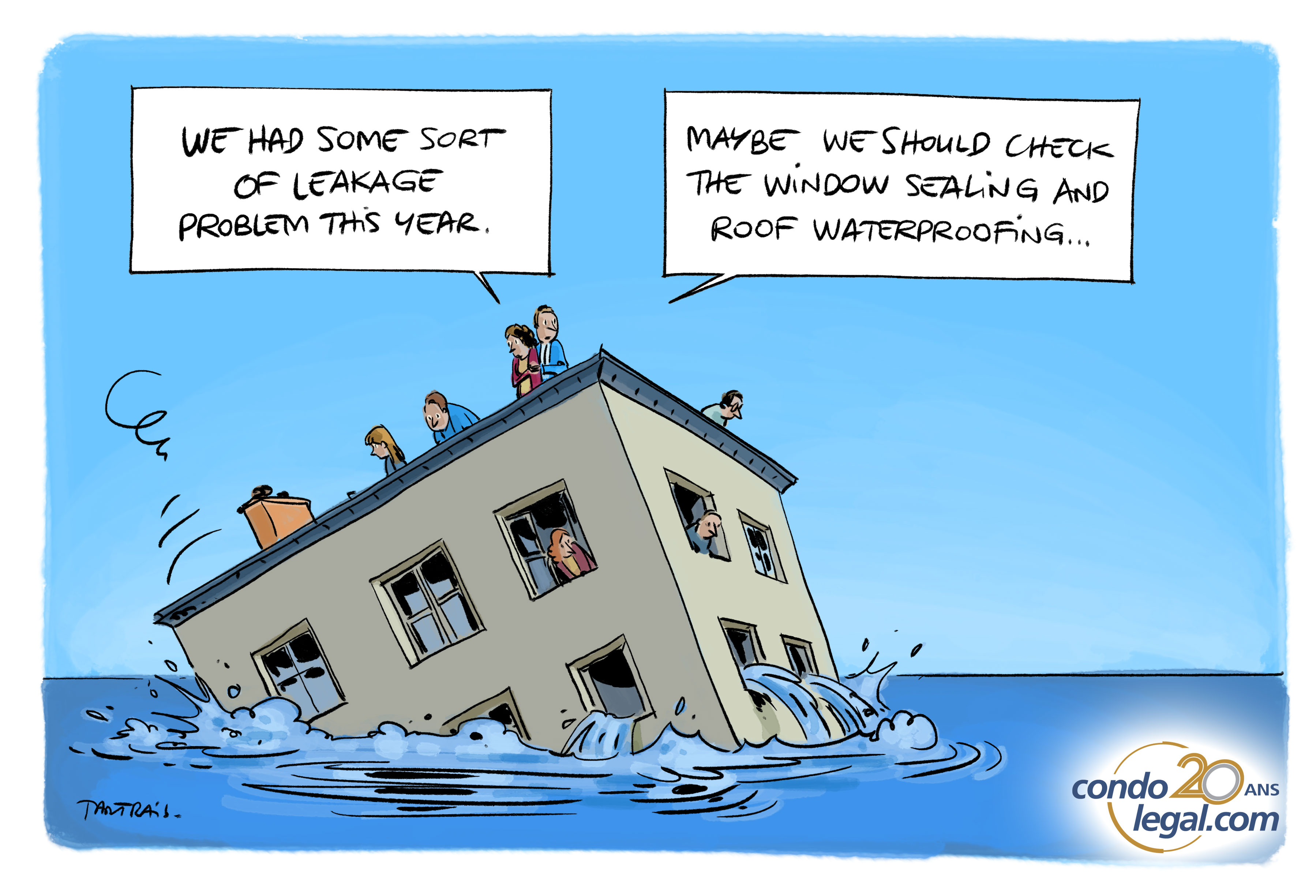 The Syndicate's obligation to maintain the common areas, and more particularly the common portions for restricted use, is a subject that has given rise to much debate since the 1994 reform. This obligation, although clearly defined, has often been a source of conflict and misunderstanding. Directors often find themselves in an awkward position when co-owners require major work to be carried out. This work may involve a seriously damaged balcony or, as was the case in the Marchand case, a glass roof that is the constant source of water infiltration.
The Syndicate's obligation to maintain the common areas, and more particularly the common portions for restricted use, is a subject that has given rise to much debate since the 1994 reform. This obligation, although clearly defined, has often been a source of conflict and misunderstanding. Directors often find themselves in an awkward position when co-owners require major work to be carried out. This work may involve a seriously damaged balcony or, as was the case in the Marchand case, a glass roof that is the constant source of water infiltration.
Facts
The Marchand couple owns a co-ownership unit located on the fifteenth floor of a building located in Laval. The real estate complex has 88 units and it is a luxurious complex, which advocates the comfort, tranquility and safety of its occupants.
Water infiltration began in 2003 and 2004, worsened over time and, to some extent, by botched work carried out by contractors hired by the Syndicate. Water seems to seep in either through the roof of a glass roof or through the adjacent wall. The glass roof is a year-round living room, open to about 17 feet and opening onto the living room and kitchen.
Legal proceedings
Legal proceedings were instituted by the co-owners in 2004. The Marchand requested the issuance of an injunction so that the Syndicate, which is required to do so under articles 1039 and 1077 of the Civil Code of Québec, among other things, would have the work required to stop the water infiltration carried out.
Since at least April 2004, the defendant syndicate, through its expert, who seems to wear several hats in the file, has been conducting tests to find the source of the water infiltration in the Marchands' condo. The Judge's greatest reproach to the Syndicate and its directors is their inaction.
According to the Syndicate and their directors, who are being sued personally in this case, the Syndicate is doing what it "can" and is acting with respect to the plaintiffs "as it would with respect to all the other co-owners", no more, no less. Wrong, said Judge Auclair. It is not enough to "treat" co-owners who suffer water damage on a constant basis, as if it were a normal disorder in a luxury condominium.
On 3 or 4 occasions, some work, including major work on the canopy itself, was carried out by the Syndicate's contractors, without any success.
The situation went from bad to worse and in October 2005, war-weary, discouraged and anxious, the Marchand decided to force the syndicate to do the required work by instituting an interlocutory injunction procedure. This is an emergency measure designed to force the syndicate to do the required work before the case is heard on its merits, since the time required will be far too long under the circumstances.
Throughout the course of the legal proceedings, which began in 2004, tensions between the parties continued to rise. So much so that the directors, who had been sued personally for their inaction, decided in turn to sue the plaintiffs for damages, arguing that the plaintiffs were self-centered, assertive individuals who exaggerated the importance of the problems suffered.
While in October 2005, the plaintiffs collected some 12 litres of water in containers, including a large bin provided by the building's janitor, a director of the defendant syndicate went so far as to blame the plaintiffs for intolerance, incomprehension, impatience and self-centeredness. This was too much for Auclair J.A. and he decided, in view of the overwhelming evidence, to grant the injunction.
The Judge rightly pointed out that the defendant syndicate, their directors and even their expert had forgotten their obligation to achieve results, which was to provide a building without water infiltration. We were not talking here about a few droplets, but rather about an impressive amount of water collected between the time of the institution of the interlocutory injunction procedure and the judgment of November 4, 2005.
Judge's conclusions
Seeing the lack of diligence on the part of the syndicate and its directors, Justice Auclair granted the injunction and appointed the architect retained by the plaintiffs as an expert, ordering the syndicate to carry out all the required work under his supervision. This is the first case where a co-owner has been able to force a syndicate to carry out work on the building envelope, while retaining the services of the professional who will be in charge of supervising the work. In view of the particularly difficult and aggravating circumstances for the Union in this case, it is only natural that the Judge should have so concluded.
Moral of the story
Too many directors ignore the maintenance obligations incumbent on the Syndicate of Condominiums for the entire building envelope. This obligation generally applies to all common portions of the building, including common portions for restricted use such as balconies, skylights, and other comm portions on portions.
Directors and managers, be on the lookout. It is important for you to understand the nature and degree of your responsibilities when it comes to the maintenance of the building and its envelope, always in the interest of all co-owners. The maintenance obligation is high and important. It is a matter of maintaining the value of their investment for co-owners, and this obligation should be taken seriously by all co-ownership directors and managers.
Otherwise, all of them risk swallowing up huge sums of money in costly and often aggravating legal proceedings for the individuals concerned.


